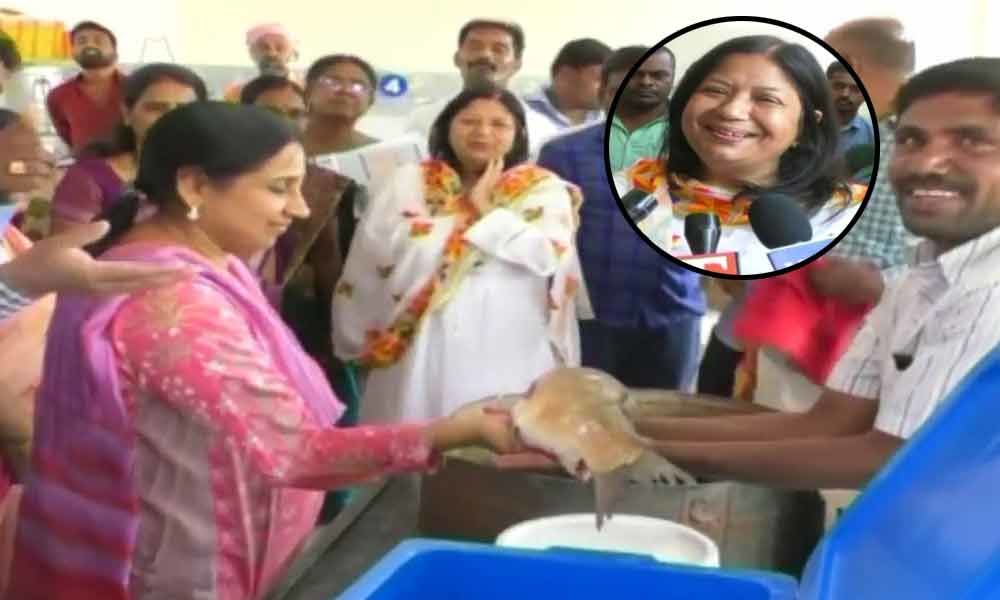Live
- Maoist killed, jawan injured in encounter
- Kerala Police Officer Brutally Murdered By Estranged Husband In Tragic Domestic Violence Case
- Pallishree Mela records good sales at Bali Jatra
- Kharif paddy purchase begins in Bargarh
- Faeces forced into tribal woman’s mouth
- Hyderabad's Air Quality Worsens as Winter Settles In | AQI Levels Reach Moderate Range
- Dead' Man Wakes Up En Route To Cremation In Rajasthan; Three Doctors Suspended
- Odisha to study root causes for migration of labourers
- Forest officials accountable for wildlife deaths: Minister
- WhatsApp Update: WhatsApp Introduces Voice Note Transcription
Just In

Rajni Sekhri Sibal, Secretary, Department of Fisheries, Government of India, said that there is a huge potential for harnessing tuna and tuna like species in the Indian EEZ (Exclusive Economic Zone).
Hyderabad: Rajni Sekhri Sibal, Secretary, Department of Fisheries, Government of India, said that there is a huge potential for harnessing tuna and tuna like species in the Indian EEZ (Exclusive Economic Zone).
In her inaugural address at the 23rd session of the Indian Ocean Tuna Commission (IOTC) here today, Smt. Sibal said that the Indian EEZ spread in the Andaman, Nicobar and Lakshadweep islands comprises 30% of the EEZ but only 1% of the production of tuna fish. Emphasising the need for regional cooperation between IOTC member countries, Sibal said that there is need for responsible and sustainable management of tuna. IOTC has to ensure that there is a level playing field between the developed and the developing nations, she said.
Sibal further said that India is the second largest fish producing country, India contributes 6.3 percent of the global fish production. There is a great potential for growth in the fisheries sector which is at present 7 percent, sustaining 14.5 million fishermen.
She said that, fisheries is a sun rise sector in India, considering the commercially viable global tuna market, which stood at US $ 11.38 billion in 2017, and projected to reach US $13.75 billion by 2023, she said, it is imperative that we enhance productivity, maintain quality control and improve infrastructure. As the shelf life of tuna is very short, it is very important to develop cold chains and ensure the catch is marketed at the earliest, she added.
Sibal said that in the present IOTC session, quotas of tuna to be caught in the economic zones of the member countries would be fixed.
The Government of India has created a separate Department of Fisheries in the Ministry of Animal Husbandry, Dairying and Fisheries in February 2019. India plans to develop its capacity in deep sea fishing and play a pivotal role in IOTC towards conservation management, and sustainable harnessing of tuna and tuna like species, which are becoming endangered.
IOTC is a Regional Fisheries Management Organization (RFMO) under the Food and Agriculture Organization, responsible for the management of tuna and tuna like species in the Indian Ocean.
Currently there are 31 members in the IOTC including India, Australia, Bangladesh, China, Comoros, Eritrea, European Union, France, Indonesia, Iran, Japan, Kenya, Korea, Madagascar, Malaysia, Maldives, Mauritius, Mozambique, Oman, Pakistan, Philippines, Seychelles, Sierra Leone, Somalia, Sri Lanka, South Africa, Sudan, Tanzania, Thailand, United Kingdom and Yemen.
Rani Kumudini, Chief Executive, NFDB; Dr. K. Gopal, Principal Secretary, Animal Husbandry, Dairying and Fisheries, Government of Tamil Nadu; Sandeep Kumar Sultania, Principal Secretary, Animal Husbandry and Fisheries, Government of Telangana; Dr J. Balaji, Joint Secretary Marine Fisheries, Government of India Suvarna, Commissioner Fisheries Telangana, Christopher O'Brien, Executive Secretary of IOTC; Alejandro Anganuzzi, Global Coordinator, FAO and Susan Imende Ugandi, Chairperson of the IOTC were also present.

© 2024 Hyderabad Media House Limited/The Hans India. All rights reserved. Powered by hocalwire.com







